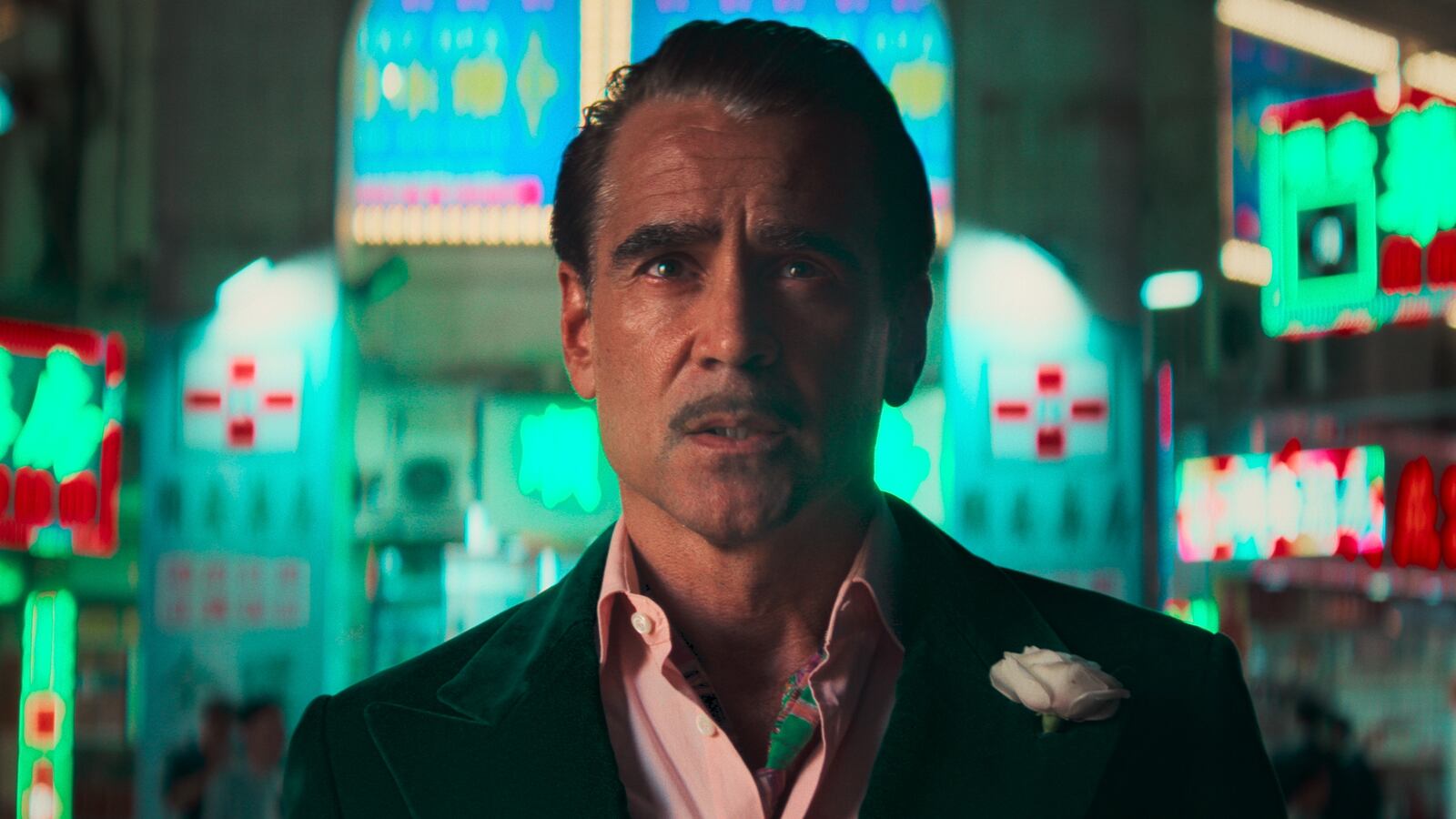With a dainty mustache, a collection of colorful suits, an ascot around his neck, and yellow “Savile Row” gloves that he considers good luck, Lord Doyle (Colin Farrell) has a swanky panache that, as one acquaintance remarks, makes him look like a “show off.”
The same can be said about Ballad of a Small Player, All Quiet on the Western Front and Conclave director Edward Berger’s tale of an inveterate gambler on the run from both debtors and himself. Stylized to the hilt but empty inside, it faithfully echoes the harried shallowness of its protagonist, whose desperate search for one big score to reverse his fortunes is all surface, no substance—the cinematic equivalent of a knock-off Rolex.
Debonair and cocky, Lord Doyle resembles a caricature of a high-roller.
Ballad of a Small Player, just screened at the Toronto International Film Festival ahead of its Oct. 15 theatrical release and Oct. 29 Netflix debut, highlights the contrast between his external and interior states in an opening scene in which he puts himself together in a disheveled casino hotel room. Downstairs, he’s informed that the establishment has no limos to offer him, and an executive has even worse news: He owes a considerable sum and has three days to settle up.
Lord Doyle is concerned about this situation. Still, it’s clear from his darting eyes and disingenuous tongue that he’s accustomed to such trouble, and he heads off to the Rainbow casino to seek the baccarat hot streak that’ll set everything straight.

That’s not to be, however, because he runs headfirst into a wealthy and unbeatable grandma (Deanie Ip) who cleans him out. Casino manager Dao Ming (Fala Chen) offers him a line of credit that borders on the predatory, and he willingly takes it, not least of which because he has eyes for her. Dao Ming seems to feel likewise, although another client’s suicidal plunge off a lofty balcony burdens her with guilt, as well as speaks to her own desperation, since she’s also in hock.
Together, Lord Doyle and Dao Ming are a romantically damaged and doomed couple, or so Ballad of a Small Player imagines. Yet as with everything else in his latest, Berger too insistently sells his characters’ tortured emotional plights, confused identities, and parallel conditions, draining the material of any lyrical fatalism.
Everywhere Lord Doyle turns, he’s greeted by reflective surfaces—mirrors, puddles, sink basins, trash cans, etc.—that double him in Berger’s frame and italicize his fragmented of-warring-minds duality.
Ballad of a Small Player is an anthology of visually bold compositions, with Berger’s camera rotating, twisting, flipping, and gazing at Farrell’s shady risk-taker from cockeyed angles, the better to hammer home his anxiety and to gussy up a story that, in most respects, is rote and tepid.

The film works overtime to look like a million bucks, but its glitz is as superficial as its characterizations. Lord Doyle is a compendium of ticks, failings, and frenzied freak-outs in which his refined façade is stripped away—by flights from baddies, and nights spent sleeping on beach benches—and he’s left a scruffy, sweaty mess whose chest pounds ominously and whose ears detect ethereal whispers and suggestive creaking noises.
In a casino elevator, Lord Doyle notices Cynthia Blithe (Tilda Swinton) snap a covert picture of him. Upon confronting her in a bathroom, he discovers that she’s from a private investigation firm that’s been hired by another entity to recover the fortune he stole from a rich old lady while going by his real, more pedestrian name.
She too gives him a deadline to pay what he owes or face serious consequences—in this case, the authorities—and in response, Lord Doyle goes on the run, convinced that it’s a “statistical improbability” that he’ll keep losing. This self-destructive hopefulness renders Lord Doyle just another in a long line of movie gaming addicts, and the fact that he’s also christened a “lost soul” by multiple characters doesn’t help alleviate the impression that he’s a fourth-generation photocopy.
Farrell goes all-in as the reckless fool, but as with his misguided Apple TV+ series Sugar, Ballad of a Small Player is a thriller with noir pretensions and an otherworldly bombshell that’s too obvious to make a meaningful impact.
Berger’s inability to hide his film’s twist means that viewers are two steps ahead of Lord Doyle. On top of that, references to the Festival of the Hungry Ghosts—during which people appease restless spirits by burning their Earthly items—and to a particular specter whose hunger couldn’t be satiated, speak leadenly to the gambler’s predicament (and appetite). Rowan Joffé’s script has plenty of action but little elegance, and as the overt articulations of character and theme pile up, the proceedings buckle under the strain.

Berger’s vision of Macau as a flashy neon-drenched fantasia of glittering buildings, cascading fountains, and opulent suites is moderately seductive, but his and cinematographer James Friend’s imagery lacks inviting texture; no matter that it’s in tune with Lord Doyle’s hollowness, the action’s shiny sheen keeps everything at a remove, as if it were taking place behind a thin pane of glass.
Eventually, Ballad of a Small Player assumes a more overtly dreamy quality, marked by fuzzy figures slowly coming into focus, bewildering transitions, and over-the-top behavior by its protagonist as he gets closer to achieving the “miracle” he covets. Unfortunately, there’s nothing hypnotic about Lord Doyle’s dilemma, and at a certain point, his frazzled feverishness becomes not just a familiar affectation, but an annoyance.
Given how enthusiastically it duplicates them, Ballad of a Small Player knows that it’s operating in the shadow of The Gambler, Casino, Croupier, Rounders, and Uncut Gems (to name only a few). Frustratingly, though, it has few novel moves of its own. Take away the unique Macau setting (which, at times, causes the film to flirt with orientalism), and what’s left is a routine fable about a punter who must learn the folly of his ways and the real meaning of wealth, luck, and contentment.
Farrell is such a commanding presence that he’s never boring, but his latest is a losing hand.









